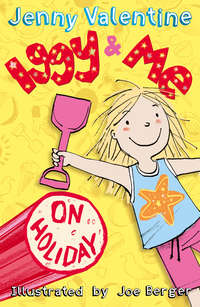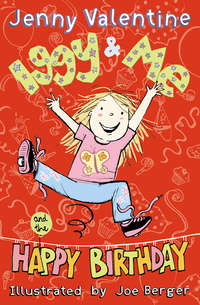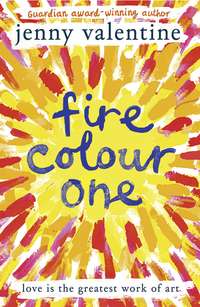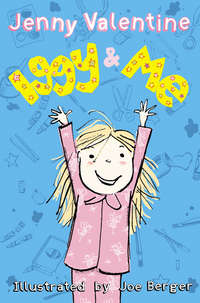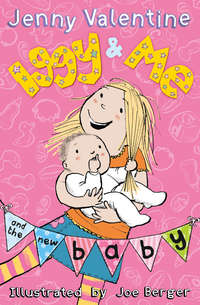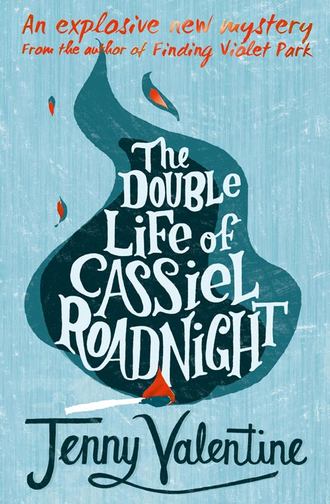
Полная версия
The Double Life of Cassiel Roadnight

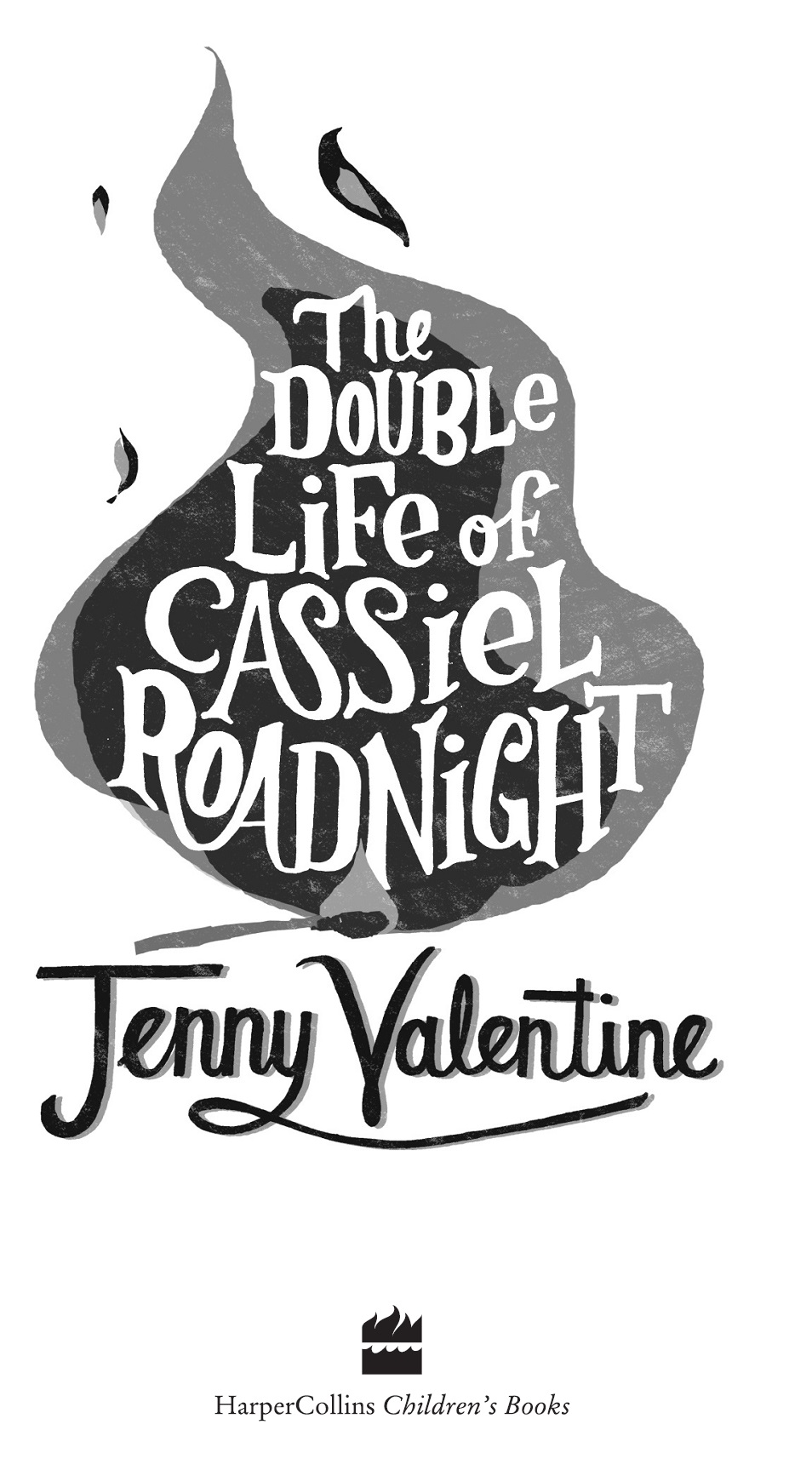
COPYRIGHT
HarperCollins Children’s Books An imprint of HarperCollinsPublishers Ltd 1 London Bridge Street London SE1 9GF
www.harpercollins.co.uk
First published in Great Britain by HarperCollins Children’s Books in 2010
Text copyright © Jenny Valentine 2010
Jenny Valentine asserts the moral right to be identified as the author of this work.
All rights reserved under International and Pan-American Copyright Conventions. By payment of the required fees, you have been granted the nonexclusive, nontransferable right to access and read the text of this e-book on-screen. No part of this text may be reproduced, transmitted, downloaded, decompiled, reverse-engineered, or stored in or introduced into any information storage and retrieval system, in any form or by any means, whether electronic or mechanical, now known or hereinafter invented, without the express written permission of HarperCollins e-books.
HarperCollinsPublishers has made every reasonable effort to ensure that any picture content and written content in this ebook has been included or removed in accordance with the contractual and technological constraints in operation at the time of publication.
Source ISBN: 9780007283613
Ebook Edition © August 2013 ISBN: 780007489305
Version: 2015–04–01
DEDICATION
For Maikki Ranger, my accidental twin.
CONTENTS
COVER
TITLE PAGE
COPYRIGHT
DEDICATION
ONE
TWO
THREE
FOUR
FIVE
SIX
SEVEN
EIGHT
NINE
TEN
ELEVEN
TWELVE
THIRTEEN
FOURTEEN
FIFTEEN
SIXTEEN
SEVENTEEN
EIGHTEEN
NINETEEN
TWENTY
TWENTY-ONE
TWENTY-TWO
TWENTY-THREE
TWENTY-FOUR
KEEP READING
ACKNOWLEDGEMENTS
ABOUT THE AUTHOR
BOOKS BY JENNY VALENTINE
ABOUT THE PUBLISHER
ONE
I didn’t choose to be him. I didn’t pick Cassiel Roadnight out of a line-up of possible people who looked just like me. I just let it happen. I just wanted it to be true. That’s all I did wrong, at the beginning.
I was in a hostel, a stop-off for impossible kids in east London somewhere. I’d been there a couple of days, walked in off the streets half-starved, because I had to. They were still trying to get hold of me. They were still trying to find out who I was.
I wasn’t going to tell them.
It was a tired place run by tired people. It smelled of cigarettes and floor polish and soup. They gave me old clothes, washed thin and mended and almost the right size. They asked me lots of questions in return for two meals and a dry place to sleep.
I tried to be grateful, but I didn’t speak to them.
They locked me in a storeroom for fighting. Hot and airless, four pale walls, a shut and rusted filing cabinet, a shelf piled with papers, a stack of chairs.
The boy I fought with was hurt. That’s why I was locked up really, for winning. You’re not allowed to do that. I don’t remember his name. I don’t remember what the fight was about even.
I was in there for over two hours. I wanted to wreck it. I watched myself doing it, somewhere in my head.
I heard one of them coming, saw the wavering, moss-coloured shape of her through the mottled glass of the door. I banged on it hard. She stopped and turned and took a quick breath of her disappointed air.
Her voice was small and jumpy. “What do you want?” she said.
“I want you to let me out.”
“I can’t do that.”
I put my head against the cold skin of the wall. “Please help me,” I said.
“Are you hurt?” she said. “Are you bleeding?”
“I’m thirsty.”
She didn’t say anything.
“You can’t deprive me of water.”
“I’ll go and ask,” she said, and through the glass she warped and gathered and was gone.
I counted to four hundred and thirty-eight.
When she came back, she had someone else with her. They unlocked the door and swooped in with a plastic cup half-filled with water. I drank it down in one. It wasn’t enough.
The man had a hooked nose and loose, curly hair. I’d seen him before, but not her. He sounded like keys jangling.
He said, “Have you finished fighting?”
I shrugged. “Probably not.”
I didn’t like the way the woman was looking at me. I stared back so she would stop, but she didn’t. Between us there was just the blood in my ears, pounding and pumping, and the look on her face.
She kept her eyes on me while she spoke to the man, and when she left the room. “Hang on a minute, would you? I’ll be right back.”
The man sat in one of the chairs, shifting, trying hard to look relaxed. He leaned towards me and his black eyes blinked, quick and vigilant, like a bird’s. I wondered if he minded being alone with me. I wondered if he was afraid.
“Why won’t you tell us your name?” he said.
I pretended he wasn’t there. I pretended he wasn’t talking.
“I’m Gordon,” he said. “And the lady’s name is Ginny.”
“Well done,” I said. “Good for you.”
“And you are?” he said.
I looked at my shoes, somebody else’s shoes, black and lumpy and scuffed. I wondered how many nobodies had worn them. I felt the fabric of someone else’s shirt against my skin, nobody else’s trousers. How was I supposed to know?
I smiled. “I’m nobody,” I said.
“Oh, come on,” he said. “Everyone is somebody.”
It was amazing really, how he could be so sure of that.
It was the 5th of November when I found out I wasn’t who I thought I was. I remember the exact moment. I didn’t know myself any more. I asked a man for the time so I could commit it to memory. He looked at his watch and told me it was twenty-five past seven. Then he just went back to his newspaper.
I said, “Do you know me? Do you know who I am?” I knew he wouldn’t, but I needed him so badly to say, “Yes.”
I could tell he wasn’t concentrating on his reading any more. He just had his eyes on the words while he waited for me to go away. He was scared.
The Ginny woman came back with something in her hand, a piece of paper. “Can I have a word?” she said.
Gordon got up and they left me in the room on my own again. I could hear them on the other side of the door. They were whispering, but I could still hear.
She said, “I only saw it this morning. Pure coincidence.”
“Bloody hell.”
“He’s been gone nearly two years.”
“Well. I. Never.”
“Do you think it’s him?”
“Look at it. It’s got to be.”
The door handle moved. I shut my eyes and tried to be ready. I tried to stop time. When they came back in they were altered, careful, like I was a bomb that might go off, a sleeping tiger, a priceless vase about to fall.
I thought they’d found me. I wondered how far I would get if I just ran.
Ginny’s hand hovered over mine, without touching. Gordon tried to smile. I was terrified. Was this it?
“Cassiel?” she said.
I looked straight at her. I didn’t know what was going on. “What?”
“Cassiel Roadnight?” she asked.
My name is not Cassiel Roadnight. It never has been. My name is Chap. That’s what Grandad used to call me. I always thought it was a good name. I always thought it suited me.
“Who, me?” I said.
Gordon gave me the piece of paper. It was a printout, a picture of a boy with the word MISSING across his forehead.
A picture of me.
“Oh my God,” I said, and I took in a breath and I held it.
It was old. I was about fourteen maybe, something like that. Brown hair, not long and not short. Blue eyes, same shape, same lights and colours. My face exactly – my nose, my mouth, my chin.
I wondered if it was the last photo anyone had taken of me and I wondered who took it.
I wondered why I was smiling. I didn’t smile when I was fourteen. What did I have to smile about?
“Oh my God,” I said again.
They misunderstood me. Ginny let her hand touch mine and she squeezed. Gordon blew the air from his mouth with puffed cheeks, like a deflating ball. I kept my eyes on the picture.
There was something wrong with it.
Here are some things I know for sure about my face. I see them every time I look in the mirror. I know they are there without even having to look.
One. I have two scars. The first runs from my earlobe to my cheekbone, thin and raised and shiny, like one of the mends on my shirt. A dog bit me when I was five. It hurt like hell.
The second is beneath my left eye, a red mark, a swelling under my fingers, a diamond-shaped hole made by a boy with rings on every finger. I remember his face and I remember the sharp, weighted sound of those rings landing. His name was Rigg.
Two. I have three piercings in my left ear and two in my right. I did them myself with a needle and salt water and a cork. I breathed in deep and they didn’t even bleed. There’s nothing in them any more, no studs or rings or whatever. I took them out, but the holes are still there. My ears look like pincushions.
Three. My teeth are bad. One at the front is broken and three back ones are going to come out, even though they’re supposed to last me a lifetime. My teeth are terrible.
In the picture there were no scars on my face, no piercings. I had perfect teeth. I was happy and well fed and wholesome.
In other words, it wasn’t me.
I tried to tell them. I looked up from the picture and I said, “No.”
“Cassiel,” Gordon said. He crossed his legs. His trousers and his mouth made a shushing noise.
I shook my head. “Not me.”
“Come on,” Ginny said again, her hand still on mine.
I wanted to swat it off. I didn’t answer her.
“Whatever trouble you’re in, Cassiel,” she said, “whatever reason you had for running away, we can help you.”
“No, you can’t,” I said. They were too close to me. I didn’t like it.
“We’re here to help,” she said.
“Help someone else,” I said. “Help someone who wants it. I’m not him.”
“Who are you then?” Gordon asked.
Good question.
I stared at him. I smiled my angriest smile.
“What are the odds,” Gordon said to Ginny, like I wasn’t there, “of there being two identical missing boys?”
“Billions to one,” Ginny said, like that settled it.
“I don’t care what the odds are,” I said. “It’s not me.”
“So what’s your name then?”
Maybe this is it, I thought, just a trick to get me to tell them my name. I wasn’t falling for it. They weren’t going to find me. I’d managed to keep away from them for this long.
“It’s not Cassiel,” I said. “No way it’s that.”
They glanced at each other.
“Have another look,” Gordon said, and Ginny said, “Take your time.”
They didn’t believe me. They wanted to be right, I could tell that. They were going to insist on it. It doesn’t matter what you say to people like that. When they have made up their minds they stop listening.
I breathed in hard and I tried not to think. I looked at the boy in the picture. I thought how incredible it was to have a double like that, somewhere out in the world, to look exactly like a total stranger. I looked at Cassiel Roadnight’s happy, flawless, fearless face. And the thought occurred to me then, that I could be him, if I wanted. It crept in. I could see it coming and I tried so hard not to notice it.
I could be.
And if I were Cassiel Roadnight, the thought said, I wouldn’t have to be me any more, whoever that was.
You won’t exist, it said. You could wipe yourself off the face of the earth in a second. You could vanish into thin air, right in front of your pursuers.
I gave that thought my full attention. What did I have to lose?
There were people looking for Cassiel Roadnight, but they were people who cared. He had a family and friends. He had loved ones. He had a life I could step right into.
And what did I have?
Nobody. Nothing, except the fear of being found. The people looking for me just wanted to pull me apart.
I always wanted to be someone else. Doesn’t everyone?
“OK,” I said to the thought, so quietly I almost didn’t say it at all.
“What?” Gordon said.
They looked at each other and then back at me. It was like they’d been holding everything in. Suddenly there was this noise in the room of them breathing.
“OK,” I said.
“Good,” said Ginny, and Gordon said, “Your name is Cassiel Roadnight?”
“Yes,” I told him. “My name is Cassiel Roadnight,” and I watched the smile spread and stick to his face.
I lied. That’s what I did wrong.
It didn’t feel like much. Everybody lies once in a while. And just in case it counts in my defence, I wished it was the truth, I really did.
TWO
Ginny let me look myself up on the computer. She wasn’t supposed to. Using the office equipment was against house rules. But then again so was running, or having a knife that actually cut things, or eating a peanut.
“Just for a minute,” she said, and she watched over my shoulder. I could smell her breath. I could hear her swallow.
I turned to look at her. “Do you want to leave me alone?”
There’s no way she was allowed to do that. I watched her blink three times.
“Of course, Cassiel,” she said, like she worked for me or something, like this was a hotel and I was paying to be there. “I’ll be just down the hall.”
God, having a name was something. Try being nobody and asking for your space.
Cassiel Roadnight had his own missing person’s profile. He came from a small town where everybody knew him, where everybody knew each other. He went missing on fireworks night when the place was full of strangers, packed with people all come to see the procession and the dancing and the costumes and the fireworks and the Wicker Man. It happened every year. A celebration in the town, called Hay on Fire. It was a clever time to disappear.
It was the 5th of November. I looked at that date on the screen for a long time. Cassiel Roadnight hadn’t been seen since then. Nor had I.
The profile said he was wearing jeans and a dark blue sweatshirt. His face was painted silver and gold for the procession, and over his ordinary clothes he wore a black cape and a mask that covered his eyes and nose. There were photos. It was strange to see a picture of him hours or even minutes before he was gone. It was even stranger to see my own eyes looking out from behind that mask.
His disappearance was ‘completely out of character’, which means they didn’t see it coming. He didn’t leave a note, and he didn’t tell anybody he was going.
His family said they would never give up hope of seeing him again.
They said, “Cass, we miss you and think about you every day. There is no problem that we can’t solve together. Just let us know that you are OK. And please come home.”
I would have liked a message like that. It would have meant a lot to me, people never giving up hope.
There were other photos of him too, not just the firework ones. I sat in the empty office and I looked at them all: Cassiel with an ice cream, Cassiel in the football team, Cassiel with a panting dog, Cassiel on a windswept beach. It was like looking at myself with a life I couldn’t dream up, the life I wished I’d had. I knew I hadn’t been there, I knew it wasn’t true, but I willed myself to start hearing the drums in that procession, to start smelling the mud and sweat of the football pitch, to taste the strawberry pink of that ice cream, the salt and sand on my skin. I willed myself to start believing those pictures were pictures of me.
If you haven’t eaten for a few days you have to be very careful to take little bites, or the food you’ve been wishing for and dreaming about day and night can make you worse than sick. Trust me, I know. That’s why I knew not to wish for a family. I knew it was a terrible idea.
But wishing is addictive.
Cassiel Roadnight’s life slipped into my head right then and stayed there. I couldn’t make it go away. I thought about his mum and dad, about what they might look like, about how their faces would change when they saw me. I thought about his brothers and sisters, how many of them there might be, how old they were. I thought about his cosy little town and the gap he’d left by leaving. I thought about his friends. I imagined how happy they’d be when he came home.
I kidded myself that they needed me as much as I needed them. I kidded myself I could end all their suffering just by showing up.
I thought about the kind of house Cassiel lived in, about his room and how it would feel when it was mine. I thought about breakfast at the table in the kitchen, pancakes and bad jokes and orange juice and the yellow sun on our faces. I thought about going to school and having friends and being normal.
I wished for what Cassiel Roadnight had. I wished with every single breath.
I didn’t think about the knife-edge being him would force me to live on. I failed to see it. I refused to look down.
I stared at his face on the computer screen and I dared myself to try it. Either I was going to make my wish come true, or I had to go right now and tell Gordon and Ginny the truth. I could become him or I had to become me. That was my choice.
I picture it often, me walking down the corridor towards them, pretending to choose. I replay the scene in my head because it was the time just before there was no going back, the last seconds I was no one, not me and not Cassiel Roadnight yet, not quite.
My shoes squeak on the polished floor, my hands feel hot and swollen and clammy, and I think I am undecided. I think I don’t know what I’m going to do.
Undecided seems like a magical place to me now, a place before action and consequence.
Undecided is what I wish for.
I knocked on the door. Gordon and Ginny were making phone calls. They’d been talking to the police and missing persons and social services. They were all coffee and triumph and activity. My lie had snowballed into fact already while my back was turned.
“Cassiel, my man,” Gordon said, wheeling his chair away from his desk. “How’re you doing?”
It was embarrassing, him talking like that. I knew it and he knew it. I looked at him and he looked away.
“It’s Cass,” I said. “That’s what people call me.”
I didn’t know I was going to say it, but when it came out it sounded right. I liked the feeling of him in my voice. I was tall and I looked down on Gordon in his chair. I had a family and friends and somewhere to be. I was somebody. The fugitive I’d been had finally disappeared.
Nobody could get me now.
“Sorry,” he said, clearing his throat. “Cass. What can we do for you?”
I said I’d finished on the computer.
“Good lad,” he said, straightening himself. “Find what you were looking for?”
I shrugged. (Yes Yes Yes. I’d found everything I ever wanted.)
I said, “What happens next?”
Ginny said that they were arranging for my family to be told. She said, “Someone will let them know as soon as possible. Then we can sort out getting you home.”
Home.
I didn’t know what to look at. This kind of hunger burst open in my gut, this cool empty space. I licked my lips and I felt a sudden fine sheen of sweat rise in my hair and under my arms.
Gordon said, “It won’t be long now.”
I heard what he said and I didn’t hear it at the same time. I think I nodded.
Home. Was it that easy?
Ginny said, “You do want to go home, don’t you, Cassiel? Is that what you want to do?”
“Yes,” I said. “I want it more than anything in the world.”
I thought she might laugh. The whole world could have burst out laughing right then and I wouldn’t have been surprised. Who was I to want anything?
“Well, good,” Ginny said, “Of course you do.”
Gordon sat back in his chair with his hands behind his head, and because the conversation seemed to be over I left the room. I put one foot in front of the other and when I got out I leaned against the wall and shut my eyes and made my heart slow down just by asking it to.
I was him.
And with each step I took as Cassiel Roadnight, with each new slowing heartbeat, I replaced something I wanted to forget about having been me.
THREE
My grandad’s place was a big house that backed on to the park. I don’t remember anything before that. I’ve tried. Through the window I could see the playground, kids moving all over it like ants on a dropped lolly.
Being in that house was like going back in time. It was quiet and dark and book-lined and mostly brown, full of clocks ticking, real clocks counting the days away in every room. The curtains were always closed, like outside didn’t matter. Grandad thought the best thing a person could spend his day doing was reading in the dark. I don’t think it ever crossed his mind that not everybody wanted to do it.
After the accident, people kept saying it was no place for a child, the health visitors and social workers and neighbours and noseyeffingparkers, as Grandad would’ve called them.
They didn’t ask me. It didn’t matter what I thought.
There were thirteen rooms in that house. I counted them. Grandad only lived in one.
I thought he must have used them once, must have needed them for something, like a wife and kids or dogs or lodgers or whatever it was he had before he had me. He never talked about it, even if I asked him. He acted like there wasn’t anything to remember before there was him and me. He called it The Time Before, and that’s all he’d say about it.
Grandad was happiest just to sit and read and sleep and drink in the front room, the one with the big bay window you couldn’t ever see out of. Sometimes he got up and shuffled out to the loo or the kitchen or to get the mail off the doormat, but not all that often. Sometimes he ventured out to the shop on the corner and shuffled back again, bottles clinking, whiskers glinting, hair gone wild.
We had our bed in the front room by the fire, and his chair, and his books and his bottles. It was warm in there, not like the rest of the house, which was so cold your face felt it first, as soon as you went out there, then your fingers and the tip of your nose died just a little. Those were my places: the weed-run garden, the other twelve rooms and the arctic upstairs, lifeless like a museum or a film set; a perfect timepiece, fallen into quiet and fascinating ruin.
In the stifling warmth of the front room I’d run my hands over the wallpaper that felt like flattened rope. The pattern of the curtains looked like radioactive chocolates in a box. That’s what I always thought when I looked at them. Chocolates of the future. Chocolates you should never ever eat. I couldn’t imagine Grandad choosing those curtains. I often wondered who did.


